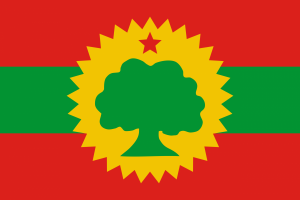Language/Borana-arsi-guji-oromo/Culture/Wedding-Ceremonies
Introduction
Borana-Arsi-Guji Oromo wedding ceremonies are steeped in cultural significance, with intricate rituals and custom celebrations that have been passed down through generations. In this lesson, we will explore the customs and traditions of Oromo weddings, including the different stages of the ceremony, the significance of various rituals, and the traditional attire worn by the bride, groom, and guests.
The Significance of Oromo Weddings
Weddings are a major event in the lives of Borana-Arsi-Guji Oromo people, symbolizing the union of two families, the strengthening of community bonds, and the continuation of cultural traditions. It is a time for celebration, with food, music, dancing, and traditional rituals that honor the couple, their families, and the ancestors who came before them.
Stages of the Oromo Wedding Ceremony
The Oromo wedding ceremony is typically divided into three main stages: the pre-wedding stage, the wedding stage, and the post-wedding stage.
Pre-Wedding Stage
The pre-wedding stage is a time for preparations and rituals that lead up to the wedding day. These may include:
- The introduction of the couple's families, with gifts and formal agreements being made between them.
- The exchange of shawls between the bride-to-be and her female relatives, symbolizing her transition from childhood to adulthood.
- The Henna ceremony, where the bride's hands and feet are decorated with intricate designs using henna paste.
- The Gadaa ceremony, a traditional ritual of the Oromo people that marks the end of the groom's youth and the beginning of his adulthood.
Wedding Stage
The wedding stage is the main event, where the couple formally exchanges vows and becomes husband and wife. This may include:
- The welcoming ceremony, where the bride's family welcomes the groom and his family into their home.
- The Nikah, where the couple formally agrees to marry in the presence of witnesses.
- The Waaqa Guuracha, a traditional oath ceremony where the bride and groom pledge to love, honor, and respect each other for life.
- The Qullubi, a ritual dance performed by the bride and groom, symbolizing their union and the start of their journey together as husband and wife.
Post-Wedding Stage
The post-wedding stage is a time for celebration and feasting, where the newlyweds are formally introduced to their community as a married couple. This may include:
- The Fatar, a traditional feast hosted by the bride's family, where guests are served food and drink, and the couple receives gifts and blessings.
- The Kursi Gaba, a ceremony where the couple takes their place on a special mat, while guests recite blessings and well-wishes.
- The Warra Qalanqalii, a festive dance performed by the bride and groom, where they are joined by their guests in celebrating their union.
Traditional Attire
Traditional attire plays a significant role in Borana-Arsi-Guji Oromo weddings, with both the bride and groom, as well as their guests, dressing in lavish garments that reflect their cultural identity and contribute to the festive atmosphere of the event.
- The bride's attire typically includes a Gurraacha, a voluminous dress made of colorful silk fabrics and adorned with intricate embroidery and beadwork.
- The groom's attire includes a Waadha, a long robe made of white or cream-colored cotton or silk, and a Saii, a colorful turban.
- Guests may wear colorful shawls and dresses made of silk or cotton, or traditional scarf-like head coverings.
Conclusion
Borana-Arsi-Guji Oromo wedding ceremonies are a meaningful and colorful expression of cultural traditions and community values. By learning about these customs and participating in the celebration of love and union, we can deepen our understanding of Oromo culture and appreciate the rich diversity of our global community.

